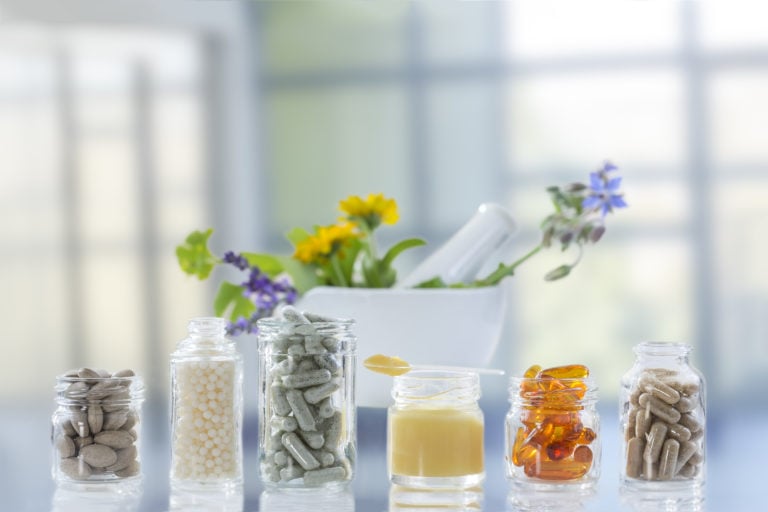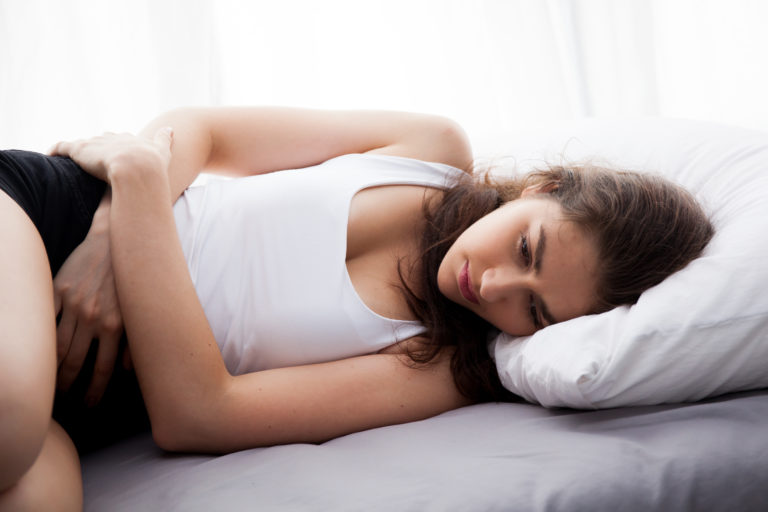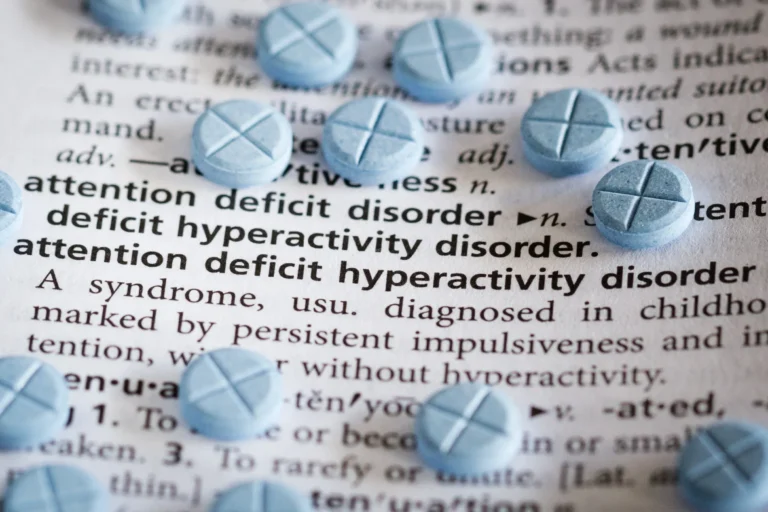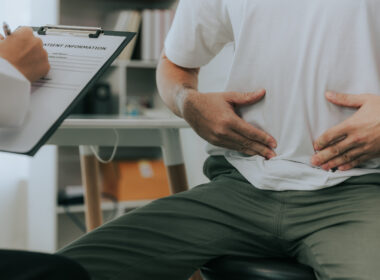Premenstrual syndrome, better known as PMS, has long been accepted as a fact of life by many women. After all, if you’re a woman of reproductive age, chances are good that at some point you’ve experienced an uncomfortable combination of telltale symptoms warning you about your period’s impending arrival—from headaches to mood swings to bloating before your period, and more. But does it have to be this way? Read on to find answers to all of your most frequently asked questions about PMS—and her even more sinister relative, Premenstrual Dysphoric Disorder (PMDD).
Is my PMS “real” or is it all in my head?
Yes, premenstrual syndrome (PMS) is definitely real! PMS refers to the cyclical emotional, behavioral, and physical symptoms that many women experience during the second half of their menstrual cycles–that is, in the weeks or days leading up to their periods. Some examples of physical symptoms include bloating, fatigue, acne, and breast tenderness, while examples of emotional or behavioral symptoms include sadness, anxiety, moodiness, and changes in appetite. It is estimated that nearly 75% of women experience some form of PMS, with symptoms ranging in severity from mild, to seriously disruptive of a woman’s everyday life.
What causes PMS? Is my PMS normal?
There isn’t a unified consensus around what exactly causes PMS. Some PMS symptoms are likely a normal sign of the hormonal shifts that naturally occur during a woman’s cycle. Estrogen dominates the first half of the cycle, until ovulation is triggered. After ovulation, estrogen begins to fall, and progesterone rises as the body prepares itself for a potential pregnancy in case the egg is fertilized and implants in the lining of the uterus. Therefore, if symptoms of breast tenderness, moodiness, and bloating occur only one to two days before your period, and are generally mild, and do not cause severe distress or functional impairment, they are not considered signs of PMS. In fact, they may just be a few of the signs that your fertility is operating as it should.
Some girls and women may be more sensitive to these natural hormonal fluctuations than others. They may experience more severe symptoms, beginning earlier and lasting longer than the day or two leading up to their period, which may cause them to miss school or work. These girls and women meet the diagnostic criteria for PMS.
Some researchers theorize that a hormonal imbalance (namely low progesterone) may be at play with more severe PMS symptoms. Various dietary and lifestyle choices may also contribute to certain PMS symptoms, including overconsumption of sugar, lack of sleep, and stress (among others–more on this, below).
Questions about the most common PMS symptoms:
- Why do I experience bloating before my period?
The natural hormonal changes that take place in your cycle can lead to more fluid retention before your period, which—you guessed it—can also cause bloating before your period. Following a healthy diet and drinking lots of water may help combat some bloat, but seeing as even Instagram fitness and diet influencers get bloated before their periods, some pre-period bloat may be unavoidable.
- Can PMS cause stomach symptoms like nausea, constipation, or diarrhea?
Yes! Although tummy symptoms are less-discussed than other PMS symptoms, the gut-hormone connection is well established. Your digestive tract is full of hormone receptors, so the hormonal fluctuations that naturally occur during your cycle may also have an impact on how your stomach feels during different times of the month (and this may be yet another factor contributing to pre-period bloating). In addition, if you already have a condition like Irritable Bowel Syndrome (IBS), you may find that your IBS symptoms worsen before and/or during your period.
- Why do I get a headache with my period?
Just as conditions like Irritable Bowel Syndrome may get worse with your period, if you are prone to migraines, these also might worsen before or during your period. If you notice that you always get a bad headache or migraine before your period, it may be due to a hormonal imbalance.
- Why am I in such a bad mood before my period?
Some moodiness may be normal before your period due to the natural hormonal changes taking place as estrogen falls and progesterone rises. Stress, lack of exercise, lack of sleep, and a poor diet can all exacerbate a bad mood before your period. Extreme mood swings before your period may be a sign of Premenstrual Dysphoric Disorder or PMDD (more on this below), or an underlying mental health issue.
- Why am I so tired before my period?
Fatigue, sleepiness, and feeling tired before your period are some of the most common PMS symptoms reported by women. Some tiredness is normal as estrogen levels are lowered during this time (conversely, your energy level is typically heightened around ovulation, when estrogen levels are at their highest), but extreme fatigue may be a sign of a hormonal imbalance.
- Why do my boobs hurt before my period?
Breast soreness before your period is likely due to a natural increase in the hormone progesterone, which rises during the last week of the cycle. Progesterone causes milk glands to swell, which can lead to a feeling of heaviness or tenderness in the breasts.
Why is my PMS so bad?
If you experience emotional, physical, and behavioral PMS symptoms, and if they are debilitating to the point of majorly disrupting your life, you may actually have what is known as Premenstrual Dysphoric Disorder (PMDD). An estimated 3 to 8% of women have PMDD, and it is a serious, devastating condition that goes far beyond PMS in its impacts on a woman’s quality of life.
How do I tell the difference between PMS or early signs of pregnancy?
Sometimes PMS symptoms and early pregnancy symptoms can be oddly similar. Breast tenderness, mood changes, fatigue… these all happen to be symptoms that some women may experience during PMS or during early pregnancy.
Want a sure way to tell if it’s PMS or early signs of pregnancy (beyond taking a pregnancy test)? Charting your fertility cycles with a fertility awareness method can help with that! If you are in the habit of charting regularly, you’ll know how long your luteal phase typically is (i.e., the time between ovulation and when your period starts). If you have been sexually active and your luteal phase is suddenly significantly longer than it has ever been (e.g., if your luteal phase is typically 12 days long, but you are now on day 17, with no period in sight), or if it gets to 18 days long or longer, you may be pregnant.
What should I do if PMS is affecting my relationship(s)?
If your PMS symptoms are putting a significant strain on your relationship(s), you may have PMDD (see “Why is my PMS so bad?” above). Charting your cycle (with a fertility awareness method) with husband/partner buy-in can help them to see exactly what is going on in your cycle, so that they can better understand (and anticipate) when your moods might be affected–and to encourage you get help if things are out of the ordinary.
Is there a link between PMS and depression or anxiety?
Some may mistake PMS or PMDD “moodiness” for underlying depression or anxiety, conditions which often worsen in the days leading up to one’s period. If your anxious or depressive symptoms do not completely resolve when your period begins, you may actually have a depression or anxiety disorder. Charting your cycle can help you keep better track of when your anxious or depressive symptoms begin and end, and how they correlate with changes in your cycle.
What are some natural treatments for PMS?
If your PMS symptoms are lifestyle-related, there are some changes you can start making today to help lessen PMS symptom severity. A healthy diet (low in sugar and caffeine), exercise, stress management, and good sleep habits can go a long way towards combating PMS symptoms. Dietary supplements/vitamins that specifically support healthy fertility may also help diminish PMS symptoms.
Charting your fertility cycles through a fertility awareness method can help you track your PMS symptoms alongside your cycle. Mindfully tracking your cycle can also help you practice better self-care before and during your period.
Can birth control treat my PMS?
No, birth control cannot treat PMS. While some women may experience relief from PMS symptoms while on birth control, birth control does not actually “treat” PMS. Rather, hormonal birth control functions to suppress a woman’s cycle, so that she neither ovulates nor menstruates–no period, no PMS, right? Unfortunately, suppressing your cycle comes at a cost, and birth control may replace your monthly PMS symptoms with a host of other unsavory effects.
For more information on PMS, PMDD, and depression, see the articles below.
-

How common are PMS and PMDD in teens?
By Madison Ayers • March 21, 2024Why birth control and antidepressants may not be the best treatments -

What is premenstrual dysphoric disorder (PMDD) and how is it different from premenstrual syndrome (PMS)?
By Anne Marie Williams, RN, BSN • May 12, 2023May is Mental Health Awareness Month, so it’s a great time to talk about…periods. Wondering how the two… -

“Why do I get pre-period bloat?” and other PMS questions, answered: A Natural Womanhood PMS FAQ
By Natural Womanhood • July 2, 2020Premenstrual syndrome, better known as PMS, has long been accepted as a fact of life by many women.… -

Supplements for PMS Symptoms that Really Work
By Lindsay Schlegel • August 7, 2019Did you know there are healthy supplements for PMS symptoms? For decades, hormonal birth control has been prescribed… -

What Kind of Exercise Works Best to Mitigate PMS?
By Lindsay Schlegel • July 16, 2019One of the first things my mom told me when she gave me the scoop on feminine cycles… -

How I Broke Free From PMS Pain
By Krizia Liquido • April 30, 2018In high school, I’d often lie on a bench curled up in pain from debilitating cramps. I knew… -

Are you depressed? Stop PMS without the Pill
By Gerard Migeon • February 1, 2015“Debbie, are you ever depressed?” The questions startled Debra Brock, a 44-year-old registered nurse from Virginia. Yes, she… -

My experience with 28, the #1 cycle syncing app
By Madison Ayers • February 29, 2024A new app aims to help women organize their lives around their cycles -

ADHD and Premenstrual Dysphoric Disorder (PMDD): Are they connected?
By Taryn DeLong • August 24, 2023It seems like every week another woman I follow online is talking about being newly diagnosed with attention-deficit… -

Why do some women experience breast soreness before their periods?
By Kristen Curran • October 6, 2023Crippling cramps, aching breasts, fatigue, mood swings… If you’re one of the 20% of women whose PMS symptoms…



